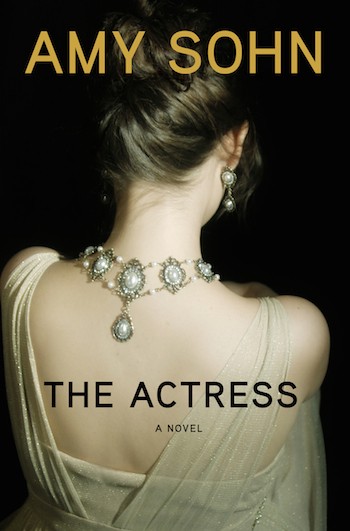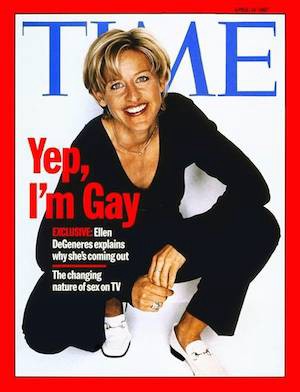Waiting On Hollywood’s LGBTQ Literacy: An Interview with Amy Sohn
by Koa Beck

In Amy Sohn’s new novel, The Actress, a millennial starlet is explicitly cast as the girlfriend of an older, closeted gay male heartthrob. Maddy Freed, an indie actress whose star is on the rise, is invited to read for an Oscar-worthy movie role opposite Steven Weller, two decades her senior. Maddy is instantly taken with Steven, a celebrated actor with a multi-decade career.
Steven has always been ripe for tabloid fodder given the endurance of his career. But despite cycling through an array of girlfriends (and one wife) over the years, gay rumors tail him constantly. Maddy, aware of the rumors, dismisses them as such and pursues a romantic relationship anyway. But as the two actors pursue different projects and end up shooting in different locations, Steven’s gay rumors resurface again and again in the tabloids, with even Maddy second-guessing the legitimacy of their relationship.
I emailed with Amy about queer representation in the media and celebrity narratives.
How did you arrive at the contemporary plot of an actress being recruited as a beard for a closeted gay male actor? Please tell me it was from reading tabloids.
Of course I was intrigued by the fact that this has been a narrative in Hollywood going back at least as far as the 1930s and continuing in current tabloid magazines. We now know that in the 1930s, several gay actors married for public-relations reasons. But in modern times, we just don’t know. This is a what-if novel, not an I-know novel.
As I sat down to write, I quickly rejected the idea of an eyes-open marriage contract because I felt the reader would not sympathize with a woman who married for money, even if the eventual complication was love. Instead, I liked the idea of someone who doesn’t know she’s been plucked and then comes to wonder if she has been. This was partly because it’s a metaphor for all marriages — we wonder to what extent we are used or using. We feel unknown or unseen or say our partner has become “a stranger.”
And it was partly because I love women-going-crazy stories. I wanted to convey the paranoia a woman feels when she worries her husband is unfaithful, and equally chilling, when she worries that she was never loved. I was very influenced by Henry James’ The Portrait of a Lady in which Madame Merle and Gilbert Osmond scheme to get Isabel to marry Osmond — and he is so seductive, and Isabel so hubristic about her own ability to help him (with her inheritance) that she throws caution to the wind, ignores all the warning signs, and marries him. Typical twenty-something.
At the end of your book, you cite Natalie Wood’s story as greatly informing The Actress — but did you also keep an eye on particular celebrity narratives?
I mentioned Gavin Lambert’s delectable Wood bio — he also wrote Inside Daisy Clover, a great film about an actress who goes mad — but this was no more influential than many other Hollywood bios and memoirs. I did toy with the idea of a Natalie Wood-style drowning but rejected it to keep the novel in the world of the real. Maddy is a quintessential pretty young thing, new to L.A., new to celebrity culture, from a small town and with amazing talent. In that, she is an amalgam. Steven is also an amalgam. What’s most important about him is that he rose to fame in the 90s, has had mainstream success, and wants more influence and power.
I read on Slate that you intentionally chose the age gap between your millennial protagonist, Maddy, and her older husband to underscore pronounced generational approaches to queer visibility, particularly for A-list celebrity men. Would you say A-list celebrity actors would endure more of a career hit for being openly queer than, say, an A-list actress?
That’s an interesting question and one I’ve thought about lately. I believe there probably would be more of a career hit for a man because there’s more of a stigma against male homosexuality. This has so much to do with the kinds of roles that A-list men play. The cartoon mannishness and over-the-top violence and how removed it is from real American masculinity at this moment.
I also find it interesting that a lot of the people who have come out are in monogamous relationships. That is much less threatening to people than the idea of a single gay man out there dating and, presumably, having sex. Celebs are coming out in the context of extremely normal, dare I say, hegemonic pairings. (I did go to Brown so I had to whip out that word.)
Couples like Portia and Ellen DeGeneres have made lesbianism visible and glam, along with actresses like Sarah Paulson — but again, she’s not an A-list movie star. Our only model is Angelina Jolie, but she had her lesbian affairs so long ago that younger film audiences probably don’t even know about them.
One of the strengths of The Actress is the way you complicate LGBTQ progress by exposing how limited that visibility really is in the mainstream media. One of your female actress characters, Kira, is an out lesbian but recounts having to wield — and ultimately reduce — her lesbianism as a “turn on” to get work in Hollywood. Do you find queer identities in the media to be manipulated in this way?
Kira doesn’t feel that she’s had to reduce her lesbianism but she feels that it’s not taken seriously by up-and-coming male directors. She does lose weight and grow her hair out — but any actress who wants to work has to do stuff like that if she wants to be able to play the widest variety of roles. This is sad, but it’s truer than ever. I love seeing women like Lea DeLaria getting all this attention, but she is a character actress. To be an ingénue you have to conform to Hollywood’s idea of beauty initially, and once you do that and get famous, you can choose to steal all the great character roles from the character actresses.
Heterosexuality is very performative in your novel — almost analogous with their professions as actors. Maddy and Steven both seem to have (although of varying degrees) a more fluid sexuality but round themselves up to straight for the sake of the ever visible media. What are you looking to comment on here?
We are living in an era where the public seems obsessed with marriage stories. This is what sells — images of couples and families and baby bumps. Hollywood has become very pro-family, even if the images we get are manipulative because they cut the nannies out of the frame. Maddy and Steven are married and each believes they love each other, so SteMad is not wholly invented. But they are aware that their individual brands are enhanced by the fact that they are a very public, stylish, attractive, married couple. I wish the tabloids would allow for some more nuanced portraits of single people — of any sexual orientation — but in the reporting we get, all the single ladies desperately want to get married and get knocked up, all the single men are commitment-phobic players until they find that one special gal. Snooze.
Without giving too much away, one of your male characters is capable of having passionate sex with women despite leaning more towards men as emotional and sexual partners. His sex with men doesn’t negate him from enjoying sex with women — even though he identifies as gay. Was this a reflection of his acting abilities or highlighting fluid sexuality?
I actually don’t feel that this character believes he is gay and I’m not sure that he truly enjoys sex with women. He is in deep denial about who he is, as capable of self-delusion as he is the delusion of others. Is his hot sex with women a series of great performances? That’s for the reader to answer. Is it possible that all sex is a series of performances, extremely richly imagined ones?
What, if anything, do you think The Actress says about bisexuality?
There are multiple characters in the novel who have had sex with both genders, but none of them ultimately identify as bisexual. I don’t try to “say” anything in my novels so much as create realistic worlds and compelling characters. My personal ideas about this: I believe that a small percentage of the population is genuinely bisexual but smaller than the number of people who actually identify as bisexual at some point in their lives.
Maddy is a modern-day beard in an industry, and an era, that seems to be more LGBTQ literate. What do you think about this particular role for women has changed, and ultimately, not changed?
For me the beard idea was ultimately a way to write about this modern, confining moment for actresses within the system. Though we have some great high-profile examples of women writer-actresses who are breaking boundaries, women’s roles are in big-budget studio movies are still underwritten, flimsy, and very disappointing. Watch any movie made before around 1985 and you’ll see a wider variety of women’s roles, better writing for women, and more complex ideas about womanhood.
So while society may be more LGBTQ literate, I’m not sure Hollywood is. There are so many out gay and lesbian executives, but they don’t always push for LGBTQ content. It really depends on the outlet. TV is more interesting than movies right now on LGBTQ themes, and it has better and not un-coincidentally, it also has more rewarding roles for women.

The crux of your book really rests on the impending importance of being out and how this component of LGBTQ advancement is still very pertinent, despite increased tabloid covers about celebrity coming out narratives. Do you think coming out often gets dismissed as less meaningful in our increasingly progressive times?
The “Yep, I’m Gay” cover is now over 15 years old, right? This is a complex time for coming-out narratives. We have bloggers who are dogged in their coverage of “closeted” gay celebs, so dogged that some of these celebs actually come out just to shut them up and wrench control of the narrative. Outweek did it decades ago, but the Internet has changed things and allowed for what I’ll call “involuntary outings” to be read by a much larger audience.
At the same time, we have all these young stars coming out relatively early in their careers and claiming that they were never really not out, which is bullshit, by the way. They are doing it in a shrugging way and they are not doing it mid-career like Ellen did.
So we have gay bloggers placing more emphasis on outing than ever before, and actors and actresses de-emphasizing it. Each is trying to tell the story they want to tell. As I wrote in my Slate piece, I think someday coming-out will become an anachronism because the whole notion of a closet is will soon disappear.
Previously: An Interview with Emma Straub
Koa is a writer in Brooklyn, NY. Follow her @Koalani.